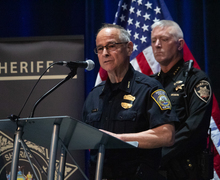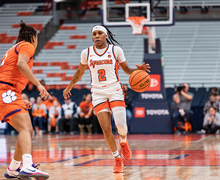The words of advice that carried Evan Adams through Syracuse
Max Fruend | Staff Photographer
Heading into the 2019 season, Evan Adams was Syracuse's active leader in games started, with 33.
At 10 years old, Evan Adams lost the man whose lessons pushed him through the rest of his formative years. Adams had spent weeks in and out of the hospital visiting his sick father, Ernest, often doing homework or eating meals there to be with his mother, Alisa.
In one of those meetings, before Ernest died from lung cancer in February 2007, Adams promised his dad he’d graduate college.
“(Evan) tried not to show it but I know it impacted him a lot,” Alisa said. “Football was an out for him. Even something that he take his frustrations out on any one person.
“It kind of saved his life from whatever the world has to bring.”
Adams was angry when he was younger and didn’t listen to his mother as much as he should. In high school he skipped class too much and didn’t understand how to keep everyone, including himself, satisfied. In college he ran into similar issues, struggling to grasp both football and academic adjustments during his freshman year, one he says now was his most transformative.
“I’m actually happy that I went through a lot of the stuff that I went through,” Adams said. “Some of the stuff I’m still in awe at. ‘I really did that?’ Or, ‘Jesus what was I doing back then?’”
Now two weeks removed from his final season with Syracuse football, Adams has completed a Bachelor’s Degree in Human development and family science. After playing under two head coaches, three offensive coordinators and three line coaches, Adams will start training for a Pro Day and hopefully a shot in the NFL. Through it all, Adams has relied on the advice from his father and other mentors to guide him.
“If you believe in something, don’t stray from it,” Adams remembered his dad said.
In the months following his father’s death, two things happened that would impact Adams’ life significantly: Alisa signed him up for football and a program known as Big Brothers Big Sisters of America, a non-profit organization that sets children up with mentors.
Adams met his mentor Wil Mims, who worked at a hedge fund in Greenwich Connecticut, not long after Ernest had died. The pair clicked immediately, and spent far more time together than the few hours a month required by the program. Adams joined Mims on dates, family gatherings and Floyd Mayweather watch parties.
Mims was a sounding board for a kid who’d lost his father and at times struggled to listen to his mother’s directions. Mims changed that by preaching what he called “Christian core values” to Adams, including how to treat his mother with respect and how to have integrity — something Mims showed Adams firsthand in his own family interactions.
After one middle school football game, Mims pulled Adams aside. Their team had just lost to a program that ran the triple option, an offense based on deception and choices that require each player on defense to execute a specific task — and the teenager was sulking. With a team of inexperienced football players, no one followed their assignment and the game was a disaster.
“Control the controllables,” Mims advised. “Because you’re a good player and you can do what you can do.”
Those words stuck with Adams as he grew older, like the time his senior year when his high school football coach Sean Ireland called Adams during the school day. Ireland knew his star player wasn’t in school, and from his cell phone a few blocks away at Subway, Adams confirmed his wrong doing.
“You better get back here right now,” Adams remembered hearing.
Adams returned to an “ambush,” he said, that included Ireland, his science teacher, another coach and a few other adults. Skipping class wasn’t new for Adams, but that didn’t mean it was tolerated.
At the time, Adams was a senior and would skip class if he felt unnecessarily ahead. Sometimes, he’d go and lift weights instead. On the field, he was the guy who sometimes hit late, or too hard. Personal fouls weren’t abnormal for him. Adams just wanted to do things his way.
In high school, he learned to get by with all of it. He was smart enough to scheme his way into adequate grades and played well enough to overcome his lapses and overaggression.
At Syracuse, though, things were different. Football in the Atlantic Coast Conference meant players were his size and stronger. College courses weren’t holding meetings when he skipped. It led to a 1.9 grade-point average during his first semester, a redshirt year in football.
That season, he watched as guys like Omari Palmer, Rob Trudo and Ivan Foy pushed opponents around the field but didn’t get penalized. They got inside the opponents heads with play between the whistles and some trash talk. For them, good personal play didn’t come at the expense of the team.
During that redshirt year, Adams missed a morning workout. He’d been out drinking the night before and slept through a training session with Will Hicks, Syracuse football’s former strength and conditioning coach. The next morning’s apology didn’t help Adams’ case. He ended up on Jacob’s Ladder, the treadmill equivalent of climbing a ladder.
Hicks ate, showered and came back out to Adams still climbing. After nearly 90 minutes, Hicks reemerged and Adams was done climbing and done screwing up for the rest of college. Adams adjusted his routine, making sure that he never missed another workout or meeting. He could stick to what he wanted, as long as it was within someone else’s larger plan.
“You know a bear’s at the top of the mountain just don’t go too close that it wakes up and mauls you in the face,” Adams said. “Just don’t do that. There’s a boundary to everything. Don’t make what you’re doing somebody else’s problem.
“Once you make it somebody else’s problem, the outcome is out of your control.”
Sitting in the basement of Bird Library, less than an hour after his final exam of college, the stories of Adams’ past mistakes make him smile. He truly believes he’s different now, that he’s learned from all of it and become better for it.
Adams hadn’t thought about the promise he made to his dad in a long time, he said, but that’s because it was never about a college degree, though Adams will be getting one. It was never about being a successful athlete, though Adams became one. His father’s words of advice, just like the ones he’d receive from others later in life, were about becoming a better man. It was about being Evan Adams, and not straying from it.
“I think I’m starting to shape myself into someone he can be proud of,” Adams said. “I carry all my accomplishments on my back as if he’s watching me. And I want to strive and do as much as I can so that him looking down on me, he can be proud.”
Published on December 11, 2019 at 4:44 pm
Contact Josh: jlschafe@syr.edu | @Schafer_44




